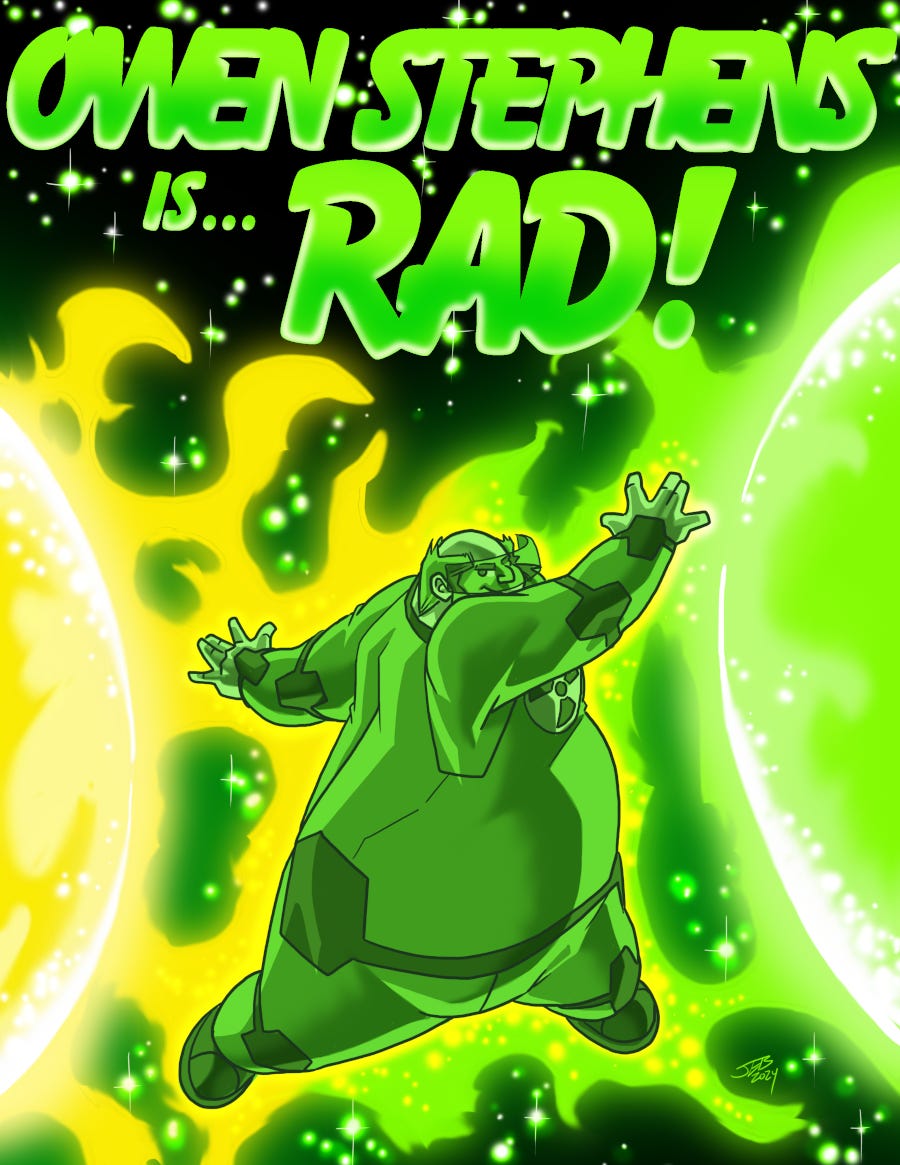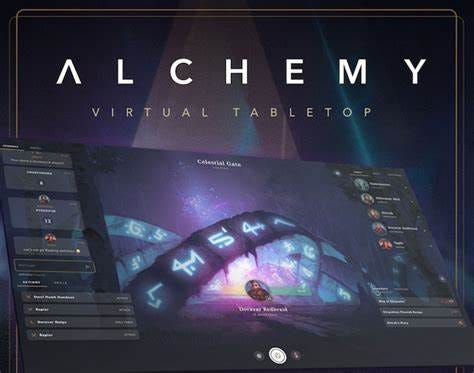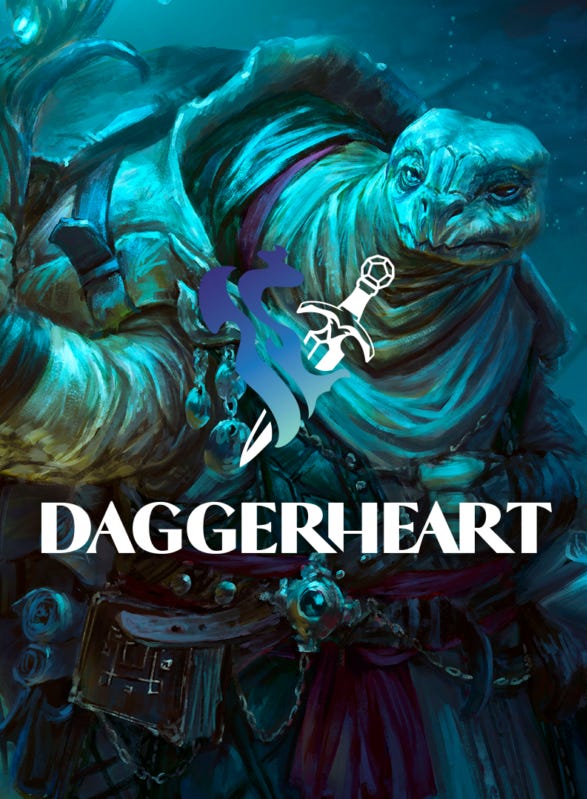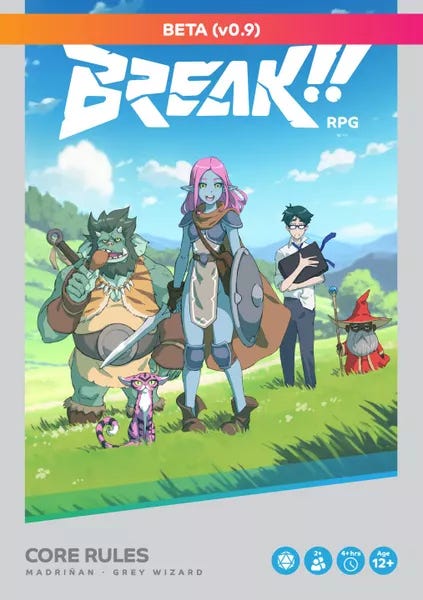Watch Well Games: Issue # 14
History of RPGs: Part 3; What's it Like Being a New, Indie Game Creator?
In This Issue:
Pocket Quest 2024 Wrap-Up: What's it Like Being a New, Indie Game Creator?
Guest Post: My Roleplaying History, Part 3
Welcome to Issue #14. I'm K.J.* We'll wind things down for the history of RPG as my good friend Warren Davidson brings us to the modern landscape for (almost) all things RPG.
First, I get real in today's update as my journey to create a game in 54 days or less for DriveThruRPG's Pocket Quest 2024 comes to a close. If you've ever wondered how this feels - being a new, indie game creator. I'm going to be candid™.
*I'm K.J. - I'm a hobbyist writer, creator, long-time GM, and player who loves supporting and encouraging others in the RPG community. I also playtest and proofread scenarios. I enjoy playing bass guitar and eating dark chocolate but not at the same time.
I started Watch Well Games at the end of 2023 to share stories and create community. I have a lot planned. Feel free to tag along.
You'll find my two indie games (“EXIT STRATEGY” and “EXIT STRATEGY: Solo Edition”) in this charity bundle. Over $1,100 worth of gaming material for $30. Learn more by clicking on the button below.
Owen Stephens is...RAD!
Conscience of a Con comes to DTRPG on April 1, 2024
If you read last week's newsletter, you saw the cover art (above) and a special offer for my newest game, “Conscience of a Con,” submitted as part of DriveThruRPG's third annual game jam known as Pocket Quest. The game will be under $5 and available April 1, 2024.
Being a New, Indie Game Creator
This was my second time entering Pocket Quest. Last year's involvement had its own series of challenges. I struggled for a variety of reasons. First, I was trying to make too many games (a lofty, yet failed, effort). Second, none of the game mechanics were proving worthy of publishing. Lastly, the unreal heat of last summer and the unreliable electric grid had me staying in a hotel the week before the deadline. Not to mention the headaches that normal life brings.
This isn't going to happen, I thought.
Until the Monday before the deadline. With only six days left, I sat at my desk and said out loud, "You have a week. Get it done." I wrote the entire game and polished the mechanics to a presentable state. I'm pretty pleased with the end result, as my only goal was to just get something published already.
And I made millions from selling thousands of copies.
Not really! But “EXIT STRATEGY” has reached Silver on DriveThruRPG. Its solo version (my second game ever)...not even close to Copper at the time of this newsletter’s release. And I feel it's an even better game. These ups and downs in a short amount of time leads me to get honest with you.
How does it feel to enter the space of indie game creators?
Depending on who you are - and who you team up with - the answer to this question can vary. Some folks come into this...hobby...career...passion - whatever you want to call it - with a enough in their bank account to fund their endeavors. They can afford to hire artists and graphic designers to do take care of those aspects while they focus on the writing. If they network with a larger gaming company, they can even find their game "played" by professional voice actors with a fully designed set, costumes, make-up, lighting, props, etc.
What if you're not one of those kinda folks?
You raise a family and hold an average job (or jobs) to make ends meet, but tucked away somewhere in the recesses of your heart is a dream.
You start acting on that dream, pouring out yourself, joyfully, for hours on end - believing that folks will notice the hard work, effort, and passion you've invested into your game. This is a part of you. Going out into the world. Rejection (via low sales or low ratings) can sting because this game, this writing...came from a dream, dusted off and refreshed by the endless possibilities you've envisioned.
Once your game is released, you wait - rather impatiently - refreshing your browser every few minutes or seconds (because this helps with sales of your game, right?).
If you're one of the lucky ones to get enough sales, you get the privilege of placing a shiny digital badge* indicating that enough folks spent money on your game (*i.e. best-seller badges offered by DriveThruRPG and similar publishing marketplaces).
My personal experience
The RPG marketplace is flooded with creatives - fantastically gifted and brilliant folks who I only wish I could be half as good as. I feel as if I can't learn fast enough at times. Perhaps the chasm from where I am to where I want to be is too broad to consider crossing, I think sometimes. Regardless, I keep devouring quality content to learn how to do layout, how to develop solid game mechanics, how to write better, how to...whatever to get the job done. I even signed up for an online game design course recently.
Since I began pursuing this endeavor, I wake up early and begin a fairly consistent routine. I am very much a creature of habit, so this is not hard. Once my usual morning routine is complete, I get to my desk and look at the to-do list on my whiteboard.
Most projects are ones I offered to do pro bono or behind NDAs to build up my portfolio and network.
As the day progresses, I take frequent enough breaks to move around and hydrate. During L. Ron Hubbard's Writers of the Future Workshop, Orson Scott Card reminded participants to keep health a priority. I take frequent dance breaks or go outside to change things up.
In between project time, I take care of family and IRL tasks. Balance is key. A crucial lesson here: Never let self-imposed deadlines kill you.
The next day: Rinse and repeat. Motivation refreshed. Dreams refueled. Passions reignited. I want to do this.
And although it's a new day in this questions about the future still come. Will all this hard work pay off? We'll see.
What's the conclusion?
You need to do this because it's something you believe in. Watch Well Games was launched with the idea to share stories and create community.
Almost every single day, I work on tasks and projects that feed into those goals. One is building out a team of like-minded folks who want to share stories and create community. Maybe you're one of them. We'll see.
Next time, I’ll talk about how I came up with “Conscience of a Con” - when I wasn’t even planning on submitting a game for Pocket Quest 2024. Inspiration comes from the most interesting of spaces.
My Roleplaying History: A commentary on the Hobby, Part 3 - The 2020s
by special guest writer Warren Davidson
I’m a long-time gamer with a passion for RPGs. I’ve written several game reviews and attended conventions where I’ve run homebrew adventures. I hope my experiences make for an interesting and fun read. And I hope one day to create and publish my own RPG.
Welcome back to the third and final part of my personal perspective on the role-playing game hobby. This time I’ll be covering the period from 2020 until present. When I first started role playing as a twelve-year old, I had no idea I would still be as passionate about the hobby forty years later. It’s truly remarkable how far roleplaying games have come in those four decades, and not just in terms of technology and rules systems but in their social acceptance and popularity. Back in the 80’s there was a stigma involved with playing D&D in that you either weren’t cool, or you were an oddball. Incredibly enough some thought the game was a gateway to devil worship and satanic practices! Today D&D is as well known as Coca-Cola and played by 50 million people with 40% aged 25 or younger and 11% of players 40 or older. 39% of players identify as female. 4.3 billion minutes of D&D content has been watched on Twitch. And the game saw a growth of 33% in sales in 2020. In the same year, Wizards of the Coast generated a total revenue of $816 million. When I started out it was an almost entirely male dominated pursuit and the chances of seeing a woman with dice in her hands was about the same as seeing a unicorn! How far we have come…
The biggest revelation for me has been the surge in online play and implementation. Roleplaying for me was always either travelling to someone’s house with a mountain of books, character sheets and dice or hosting a game around my living room table, surrounded by copious amounts of snacks and fizzy drinks. If the dice rolled off the table, they were deemed out of bounds and had to be rolled again. Badly painted metal miniatures were pushed around crudely drawn dungeons before a monster was plonked in front of them. Crude, but oh my, did we have fun.
Fast forward forty years and technological advances allow players to play anywhere, anytime on their laptops, cell phone and TVs. No longer do you have to imagine the fantastic landscapes your adventurers travel through, rather you can experience them in eye-popping detail while having stirring music play in the background. Millions watch live streamed games to learn the rules while submerging themselves in the roleplaying experience.
One such cultural phenomena has been Critical Role, a live-play D&D show that began in 2016 and set the record for fastest-funded Kickstarter in 2019, raking in over $11 million. People all over the world could watch entire D&D campaigns played out in front of them with professional voice actors giving life to their characters' exploits. They have 946,000 Twitch followers with nearly 30 million views. Indeed, last year Critical Role hosted a live event at London MCM with thousands attending just to watch a D&D game!
So, what are the factors involved in the rise of online play? I would say the COVID-19 pandemic was certainly a huge one. With millions in lockdown for months on end the world over, people needed an avenue of escape and roleplaying was the perfect outlet. Online play lets you express your creative impulses whilst making new friends from around the world. This was my experience and it’s been magical. Since I started playing online, I have run games on hundreds of people, tried out many different systems via several virtual tabletops (VTTs) and contributed to the hobby through my writing.
What VTTs are out there and how did they start? My first experience was with Roll20. It was launched as a Kickstarter back in 2012 and now has over 8 million users. It took me a while to get used to the software and I made many mistakes, such as wiping out an entire map my group were playing through! But I persevered and have run many games on the platform. Roll20 has several other competitors in the field including Foundry and Demiplane in 2020 and Alchemy in 2023. Whilst their software implementation may differ they all offer the same thing – the opportunity to play RPGs with anyone around the world at any time on a variety of platforms. While basic content is free there tends to be a subscription model where additional content and features are available for a paid download. If you have the time (and patience!) you can create your own campaigns from scratch or pay for a published one ready to play at a moment’s notice. I admit when I first ran a D&D campaign using Roll20’s dynamic lighting I was blown away. My players could now experience the wonder and terror of exploring a dungeon in real-time, see where their torch lights fell to reveal secret doors and monsters waiting in the shadows waiting to pounce on their unsuspecting characters! Add in some background music and you have a fully realised immersive experience which puts the cinema to shame. VTTs will only improve in their capacity to provide a multimedia experience and continue to bring people together of all ages and levels of experience in the hobby. It’s also a great way to introduce new players.
One aspect I feel I should comment on is playing in a safe and welcoming environment. RPG safety tools allow gamemasters and players to feel comfortable and safe. Forewarning any disturbing and violent content in the game. And allows them to bypass this content if it’s something they would rather not experience. There are several safety tools available, notably the “X-Card” where a player can touch or pick up the X-Card during a scene and the GM stops or skips over it, no questions asked. And then there are "Lines and Veils" for preemptively identifying topics players and GMs aren't comfortable including in their game. Players can list a topic as a "Line" if they don't want it to appear in the game at all, or as a "Veil" if they'd prefer to see it happen "off-screen" or described in minimal detail. The inclusion of such tools is an important one, especially when you consider the number of horror and mature content games available.
I’ve touched on online play but what of RPGs themselves? Which ones continued to dominate the field and what has been available since 2020? Well, it comes as no surprise that D&D is still the number one game by a large margin. The movie Dungeons and Dragons: Honor Among Thieves released in 2023 attests to the game’s popularity having grossed over $200 million worldwide. As of 2024 there have been 46 official D&D releases, primarily hardcovers with some box sets and four more due out this year. 2024 marks the 50th Anniversary of the game with a new update of the core rules books spread out over the tail end of 2024 and the beginning of 2025. Several game worlds which began in the 1990’s have been given a new lease of life in 5e such as Dragonlance, Planescape and Spelljammer. There is a definite sense of nostalgia pervading the D&D world currently which brings a glint of pleasure to my aging gamer eyes.
Other big sellers include Pathfinder whose 2nd edition has been recently relaunched in an easy-to-understand format. Licensed games are still proving popular with ALIEN, Blade Runner, DUNE, Fallout, The One Ring, Star Trek, the Terminator and even the Walking Dead. Older games have been given a new lease of life in lavish box sets. Dragonbane is one, originally published over forty years old and now updated with a modern ruleset and high-quality handouts and maps. All these games can be played effortlessly online with continued support for hundreds more.
The indie RPG market continues to flourish with imaginative and innovative releases. Alice is Missing by Hunters Entertainment lets you play entirely by text messages with the focus on developing strong emotional attachments while immersing you in a dramatic mystery story. The entire game is playable in 90 minutes making it perfect for one-off game play. Osprey publishing have released RPGs covering a wide range of settings from the prehistoric, through the bronze age and continuing into renaissance Italy and beyond with cyber punk and industrial science-fiction. They are all presented as smaller hardcovers, with simple rules. Fancy playing a hunter in the land of Mu then picks up Paleomythic. How about playing a mythic warrior in the ancient near east, then give Jackals a go. Jump forward a few centuries to experience a dark and cynical corporate future in Those Dark Place and Pressure or as vat-grown clones in 2090’s New York. It’s a diverse range and something I will keep a close eye on.
The LGBTQ+ community is represented with games such as Thirsty Sword Lesbians by Evil Hat Productions. Where sapphic swashbucklers take on alluring enemies and make emotional connections with the people around them. RPGs have become a totally inclusive collaborative experience. So, what does the future hold and what are the games to look forward to? I believe the hobby will continue to prosper. Humans love telling stories and what are RPGs but a refined form of this ancient practice? Books will continue to be released alongside their digital counterparts. And large and small companies alike will provide a limitless supply of imaginative settings.
This year’s biggest release will undoubtedly be the updated D&D 5e along with a multiverse spanning adventure featuring Vecna, a foe from the game’s distant past. Pendragon 6th edition by Chaosium is guaranteed to be a sure-fire hit, allowing you to play knights in King Arthur's Britain. Darlington Press who publishes Alice is Missing, is releasing Daggerheart, a fantasy RPG designed for less experienced players and connected to the Critical Hit series which will certainly prove to be popular. Break!! is an RPG inspired by anime and Japanese RPGs which uses the D20 system. Through the Hedgerow is a dark fantasy RPG inspired by authors such as Neil Gaiman and Phillip Pullman with players becoming a Knight of the Briar Company, an ancient organisation protecting humanity from sinister otherworldly forces. There’s even Jukebox: The Karaoke Musical TTRPG which encourages you to sing in front of your fellow players! As for me I will continue to roleplay into my dotage and will have to sneak some D&D books into my retirement home. It sure beats playing Dominoes or Sudoku! I hope you’ve found this series of articles informative, surprising, and overall fun to read. Game on!


















